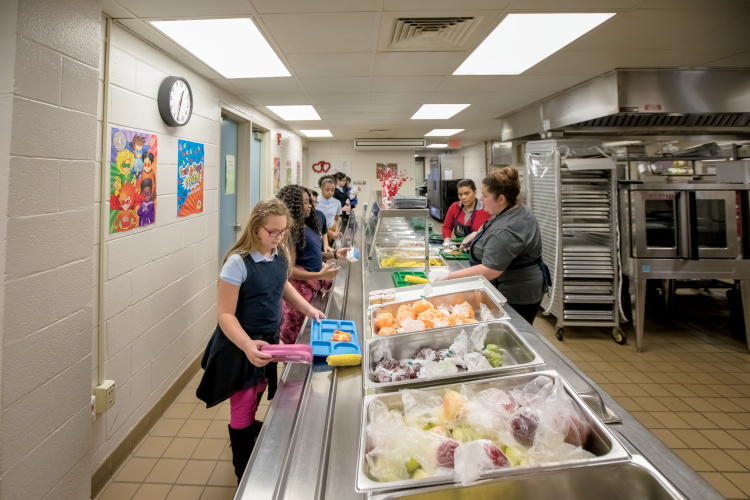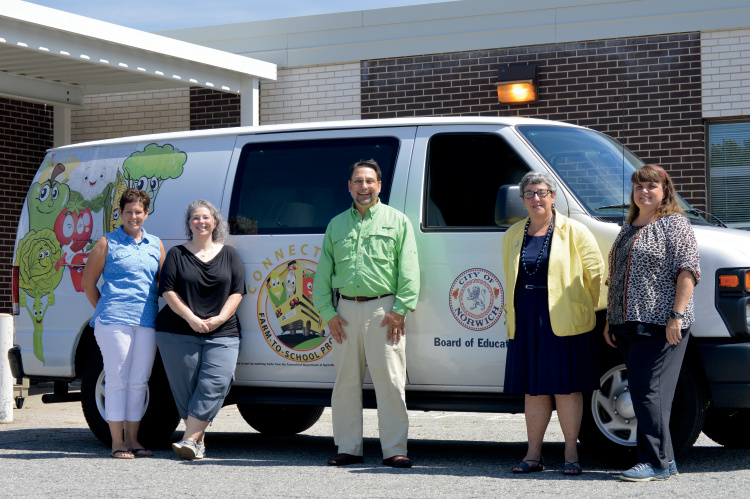Home > Connecticut > Connecticut Ag Education > Connecticut Farm-to-School Program is Fueling the Future
Connecticut Farm-to-School Program is Fueling the Future
In partnership with: Connecticut Department of Agriculture

The leaders of tomorrow line up every day in the cafeteria, with outstretched trays, hungry bellies and eager minds. Norwich Public Schools is at the forefront of a nationwide movement to bring high-quality, locally grown produce to students at school. They started out small, buying a few cases of apples from a local orchard every other week. But thanks to the efforts of Norwich Public Schools food service director Erin Perpetua, local growers and a supportive school administration, they have expanded to now bring more than 10,000 pounds of locally grown produce each year to 27 school cafeterias in three New London County school districts.
A Healthy Helping
“One of our objectives is to serve healthy meals in school cafeterias and improve student nutrition while providing agriculture, health and nutrition education opportunities,” Perpetua says. “And we want to support our local and regional farmers.”
Students discover new favorite foods, such as corn on the cob, which has become one of the most popular locally grown items on the menu, Perpetua says.

“They love it,” she adds. “A lot of the students in the district have never had corn on the cob, so when we first started serving it, they didn’t know what to think because they had only had canned corn.”
Proper nutrition is imperative for the academic and personal success of students.
“We are a district that is 73 percent free and reduced [price lunch], so a majority of our families get assistance,” Perpetua says.
The farm-to-school program supports Connecticut’s agricultural economy by increasing purchases of locally grown produce to serve in school cafeterias and provides a diversified income stream for small to midsize family-owned farms in Connecticut.
The three-district partnership, which currently provides local produce to more than 9,000 students, purchases produce from several farms, including LoPresti Farm in Preston.

“Our relationship with local schools is one we hope to maintain and build upon,” says Joseph LoPresti, co-owner of LoPresti Farm. “It also makes us feel good to know that our farm is providing healthy food for schoolchildren who might not otherwise have access to healthy, local produce.”
Norwich Public Schools also buys produce such as summer squash, zucchini and beets for processing from Provider Farm in Salem. OUR Acres Farm in Lebanon provides green, yellow and purple string beans. Malerba’s Farm in Norwich is the primary supplier of corn on the cob.
Locally Licensed
The locally grown produce is served to the students in a variety of forms and dishes. Some products, such as lettuce, cabbage and tomatoes, are used fresh, while the majority is minimally processed and preserved to last throughout the school year.
In 2013, Roberta Jacobs of Norwich Public Schools applied for and received a $49,999 Farm Viability Grant from the Connecticut Department of Agriculture to start a processing kitchen at Mahan Elementary School, and to purchase a van to pick up produce from Connecticut farmers. In 2015, Norwich was awarded a $42,100 Farm Viability Grant for improvements to the processing kitchen so more food could be processed and stored for use throughout the year.
The Norwich processing kitchen project was seen as a solution to overcome seasonality barriers associated with farm-to-school efforts. The kitchen was so successful that in 2015, New London and Groton Public School Food Service Departments asked to partner with Norwich so they could also serve Connecticut Grown produce in the cafeteria year round.

In September 2016, Mahan Elementary School became the only public school in the state with a food manufacturing license from the Connecticut Department of Consumer Protection. This license allows Norwich to sell processed vegetables to other local school districts.
The Norwich farm-to-school program also creates opportunities for job experience and career advancement by hiring current and former students to work at the Mahan Elementary School processing kitchen in the evening.
“We currently employee two high school students and two recently graduated high school students,” Perpetua says.



